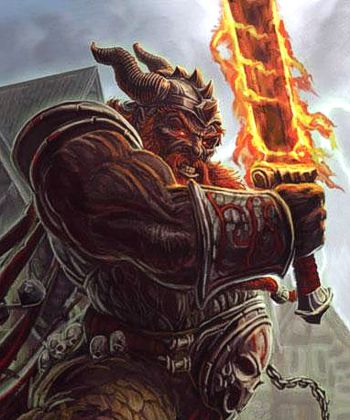

Monstrous Manual

| Climate/Terrain: | Any temperate, subtropical, tropical |
|---|---|
| Frequency: | Rare |
| Organization: | Tribal |
| Activity Cycle: | Any |
| Diet: | Omnivorous |
| Intelligence: | Low to average (5-10) |
| Treasure: | E |
| Alignment: | Lawful evil |
| No. Appearing: | 1-8 |
| Armor Class: | -1 (5) |
| Movement: | 12 (15) |
| Hit Dice: | 15 +2-5 hit points |
| THAC0: | 5 |
| No. of Attacks: | 1 |
| Damage/Attack: | 1-8, or by weapon (2-20+10) |
| Special Attacks: | Hurling rocks for 2-20 (2d10) |
| Special Defenses: | Resistant to fire |
| Magic Resistance: | Nil |
| Size: | H (18’) |
| Morale: | Champion (15-16) |
| XP Value: | 8,000 Infant: Nil Juvenile, -3: 120 Juvenile, -2: 3,400 Juvenile, -1: 5,000 Shaman/Witch doctor, 1st level spells: 9,000 Shaman/Witch doctor, 2nd level spells: 10,000 Shaman/Witch doctor, 3rd level spells: 10,000 Shaman/Witch doctor, 4th level spells: 12,000 |
Fire giants are brutal, ruthless, and militaristic.
They are tall, but squat, resembling huge dwarves. An adult male is 18 feet tall, has a 12 foot chest, and weighs about 7,500 pounds. Fire giants have coal black skin, flaming red or bright orange hair, and prognathous jaws that reveal dirty ivory or yellow teeth. They can live to be 350 years old.
A fire giant’s natural Armor Class is 5. Warriors usually wear banded mail and round metal helmets (AC -1). They carry their belongings in huge sacks. A typical fire giant’s sack contains 2-5 (1d4+1) throwing rocks, the giant’s wealth, a tinderbox, and 3-12 (3d4) common items. Everything they own is battered, filthy, and smelly, making it difficult to identify valuable items.
All fire giants can speak the language of all giants and their own tongue.
Combat: Fire giants are immune to nonmagical fire and heat, as well as red dragon breath. They are resistant to all types of magical fire; such attacks inflict -1 hit point per die of damage. Adult fire giants can hurl rocks for 2-20 (2d10) points of damage. Their minimum range is 3 yards while their maximum is 200 yards. They can catch similar large missiles 50% of the time. They usually fight in disciplined groups, throwing rocks until they run out of ammunition or the opponent closes. Fire giants often wait in ambush at lava pools or hot springs, hurling heated rocks at victims for an extra 1-6 points of damage.
Warriors favor huge two-handed swords. A fire giant’s oversized weapons do double normal (man-sized) damage to all opponents, plus the giant’s strength bonus. Thus, a fire giant two-handed sword does 2-20 (2d10) +10 points of damage.
Habitat/Society: Fire giants live in well organized military groups, occupying large castles or caverns. When encountered in their lair there will be 13-20 (1d8+12) giants, half of whom will be immature giants. To determine a giant’s maturity, roll 1d4. A roll of 4 indicates an infant with no combat ability and the hit points of an ogre while rolls of 1-3 indicate older progeny with Hit Dice, damage, and attack rolls reduced by 1, 2 or 3, respectively.
Their lairs are always protected by vigilant watchmen, and sometimes by traps. Fire giants favor deadfalls that can crush intruders for 5-30 (5d6) points of damage, and large crossbow devices that fire one, two, or three huge bolts for 2-16 (2d8) points of damage each.
Particularly intelligent fire giant leaders will command groups three or four times normal size. One who commands 30 or more giants usually will call himself a king. Kings always will have better than normal armor and a magical weapon of +1 to +3.
There is a 20% chance that any band of fire giants will have a shaman (80%) or witch doctor (20%). If the group is lead by a king, there is an 80% chance of a spell caster. Fire giant shamans are priests of up to 7th level. A shaman can cast normal or reversed spells from the Elemental, Healing, Charm, Protection, Divination, or Combat spheres. Fire giant witch doctors are priest/wizards of up to 7th/3rd level; they prefer spells that can detect or thwart intruders.
Fire giants often capture and tame other creatures as guards. There is a 50% chance that a fire giant lair will contain 1-4 hell hounds. Larger than normal groups check once for every 10 giants. Bands with 30 or more giants have a additional 30% chance to have 2-5 (1d4+1) trolls, larger groups check once for every 20 giants. A king’s group has a 20% chance to have 1-2 red dragons of age category 2-5 (1d4+1) in addition to other guards. Fire giants frequently take captives to hold for ransom or use as slaves. There is a 25% chance that a lair will contain 1-2 captives, larger bands check once per 10 giants.
Ecology: Fire giants live wherever there is a lot of heat. They prefer volcanic regions or areas with hot springs. Frequently they share their lairs with other fire-dwelling creatures such as salamanders or fire elementals.
Fire giants prefer to eat meat and bread, they can hunt and kill their own meat, but raid human and demi-human settlements for grain, captives, and treasure.
